Christian Hope 1
Chris Knepp
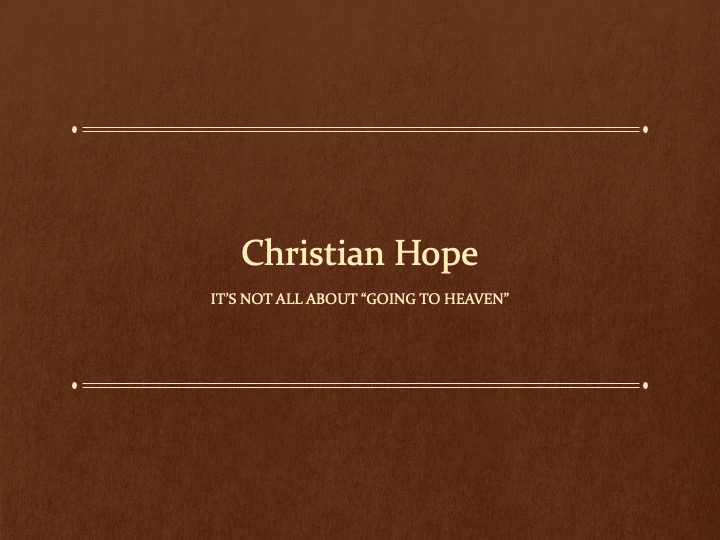
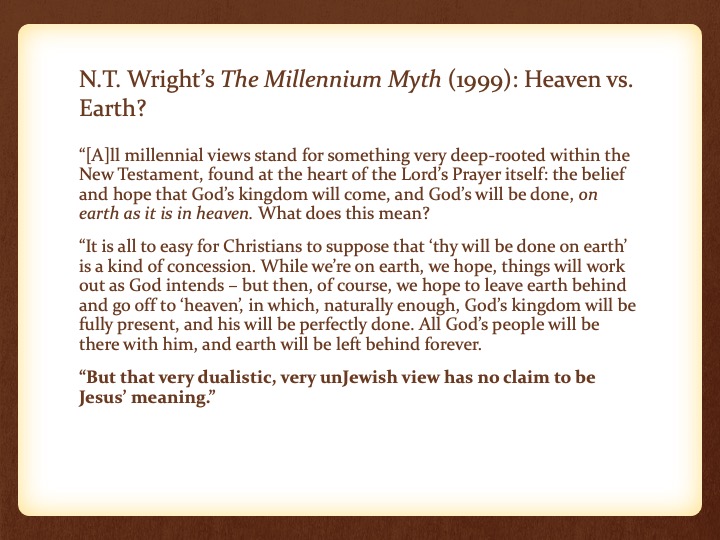
N.T. Wright’s The Millennium Myth (1999): Heaven vs. Earth?
“[A]ll millennial views stand for something very deep-rooted within the New Testament, found at the heart of the Lord’s Prayer itself: the belief and hope that God’s kingdom will come, and God’s will be done, on earth as it is in heaven. What does this mean?
“It is all to easy for Christians to suppose that ‘thy will be done on earth’ is a kind of concession. While we’re on earth, we hope, things will work out as God intends – but then, of course, we hope to leave earth behind and go off to ‘heaven’, in which, naturally enough, God’s kingdom will be fully present, and his will be perfectly done. All God’s people will be there with him, and earth will be left behind forever.
“But that very dualistic, very unJewish view has no claim to be Jesus’ meaning.”
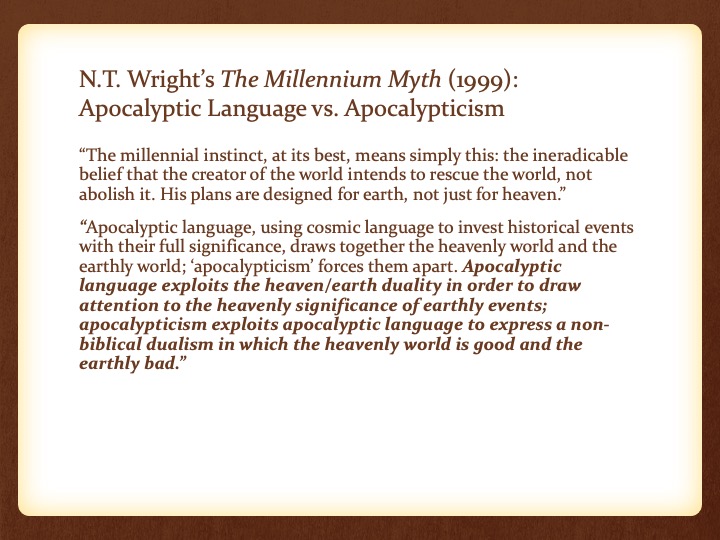
N.T. Wright’s The Millennium Myth (1999): Apocalyptic Language vs. Apocalypticism
“The millennial instinct, at its best, means simply this: the ineradicable belief that the creator of the world intends to rescue the world, not abolish it. His plans are designed for earth, not just for heaven.”
“Apocalyptic language, using cosmic language to invest historical events with their full significance, draws together the heavenly world and the earthly world; ‘apocalypticism’ forces them apart. Apocalyptic language exploits the heaven/earth duality in order to draw attention to the heavenly significance of earthly events; apocalypticism exploits apocalyptic language to express a non-biblical dualism in which the heavenly world is good and the earthly bad.”
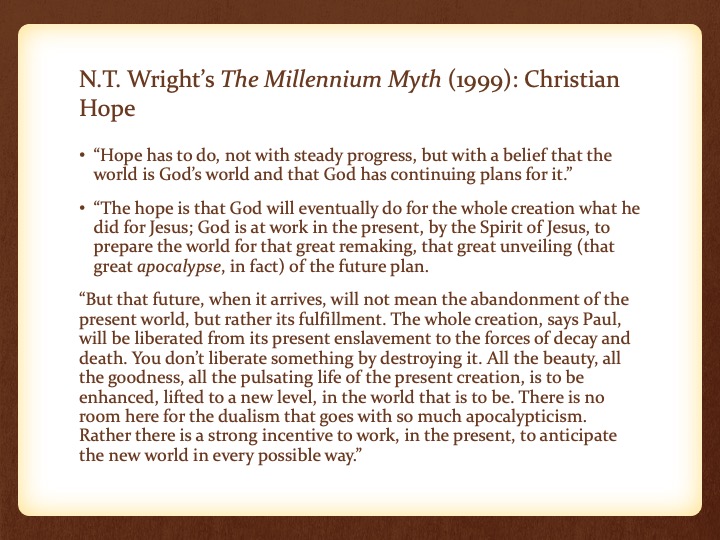
N.T. Wright’s The Millennium Myth (1999): Christian Hope
“Hope has to do, not with steady progress, but with a belief that the world is God’s world and that God has continuing plans for it.”
“The hope is that God will eventually do for the whole creation what he did for Jesus; God is at work in the present, by the Spirit of Jesus, to prepare the world for that great remaking, that great unveiling (that great apocalypse, in fact) of the future plan.
“But that future, when it arrives, will not mean the abandonment of the present world, but rather its fulfillment. The whole creation, says Paul, will be liberated from its present enslavement to the forces of decay and death. You don’t liberate something by destroying it. All the beauty, all the goodness, all the pulsating life of the present creation, is to be enhanced, lifted to a new level, in the world that is to be. There is no room here for the dualism that goes with so much apocalypticism. Rather there is a strong incentive to work, in the present, to anticipate the new world in every possible way.”
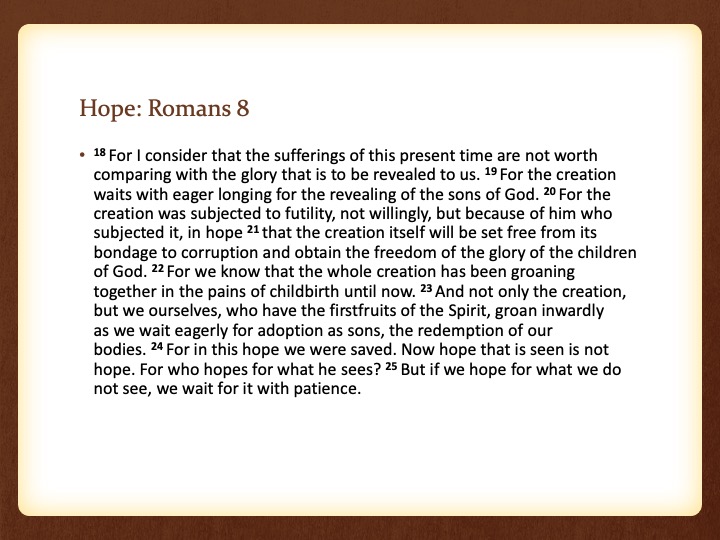
Hope: Romans 8
18 For I consider that the sufferings of this present time are not worth comparing with the glory that is to be revealed to us. 19 For the creation waits with eager longing for the revealing of the sons of God. 20 For the creation was subjected to futility, not willingly, but because of him who subjected it, in hope 21 that the creation itself will be set free from its bondage to corruption and obtain the freedom of the glory of the children of God. 22 For we know that the whole creation has been groaning together in the pains of childbirth until now. 23 And not only the creation, but we ourselves, who have the firstfruits of the Spirit, groan inwardly as we wait eagerly for adoption as sons, the redemption of our bodies. 24 For in this hope we were saved. Now hope that is seen is not hope. For who hopes for what he sees? 25 But if we hope for what we do not see, we wait for it with patience.
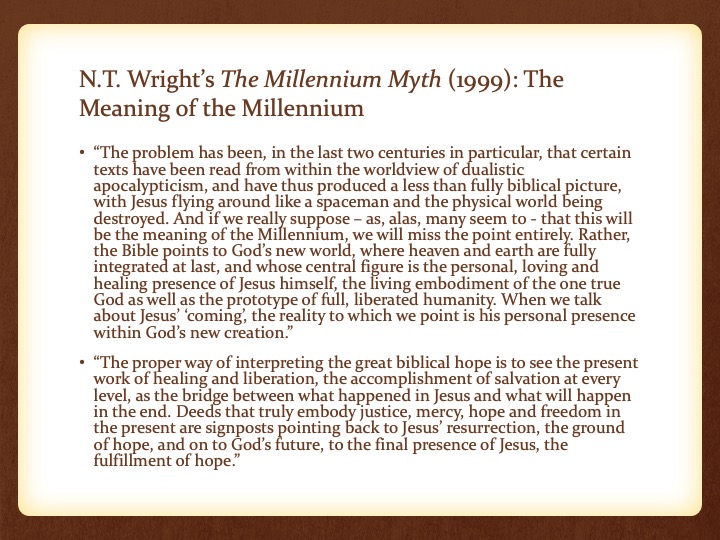
N.T. Wright’s The Millennium Myth (1999): The Meaning of the Millennium
“The problem has been, in the last two centuries in particular, that certain texts have been read from within the worldview of dualistic apocalypticism, and have thus produced a less than fully biblical picture, with Jesus flying around like a spaceman and the physical world being destroyed. And if we really suppose – as, alas, many seem to - that this will be the meaning of the Millennium, we will miss the point entirely. Rather, the Bible points to God’s new world, where heaven and earth are fully integrated at last, and whose central figure is the personal, loving and healing presence of Jesus himself, the living embodiment of the one true God as well as the prototype of full, liberated humanity. When we talk about Jesus’ ‘coming’, the reality to which we point is his personal presence within God’s new creation.”
“The proper way of interpreting the great biblical hope is to see the present work of healing and liberation, the accomplishment of salvation at every level, as the bridge between what happened in Jesus and what will happen in the end. Deeds that truly embody justice, mercy, hope and freedom in the present are signposts pointing back to Jesus’ resurrection, the ground of hope, and on to God’s future, to the final presence of Jesus, the fulfillment of hope.”
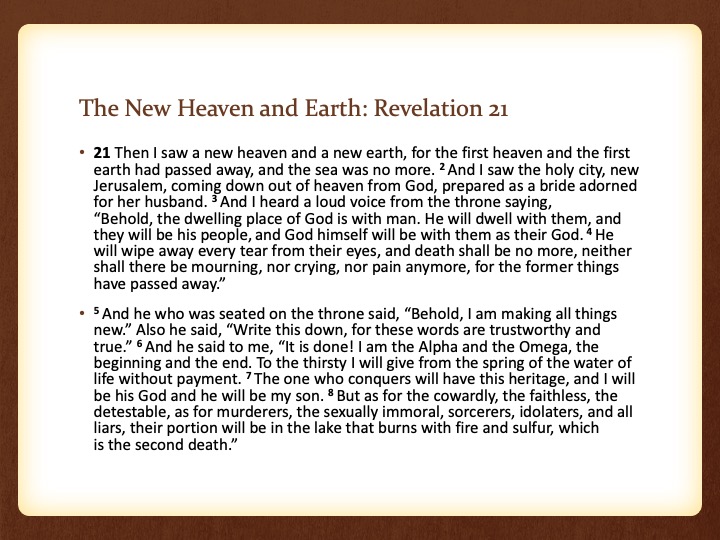
The New Heaven and Earth: Revelation 21
21 Then I saw a new heaven and a new earth, for the first heaven and the first earth had passed away, and the sea was no more. 2 And I saw the holy city, new Jerusalem, coming down out of heaven from God, prepared as a bride adorned for her husband. 3 And I heard a loud voice from the throne saying, “Behold, the dwelling place of God is with man. He will dwell with them, and they will be his people, and God himself will be with them as their God. 4 He will wipe away every tear from their eyes, and death shall be no more, neither shall there be mourning, nor crying, nor pain anymore, for the former things have passed away.”
5 And he who was seated on the throne said, “Behold, I am making all things new.” Also he said, “Write this down, for these words are trustworthy and true.” 6 And he said to me, “It is done! I am the Alpha and the Omega, the beginning and the end. To the thirsty I will give from the spring of the water of life without payment. 7 The one who conquers will have this heritage, and I will be his God and he will be my son. 8 But as for the cowardly, the faithless, the detestable, as for murderers, the sexually immoral, sorcerers, idolaters, and all liars, their portion will be in the lake that burns with fire and sulfur, which is the second death.”
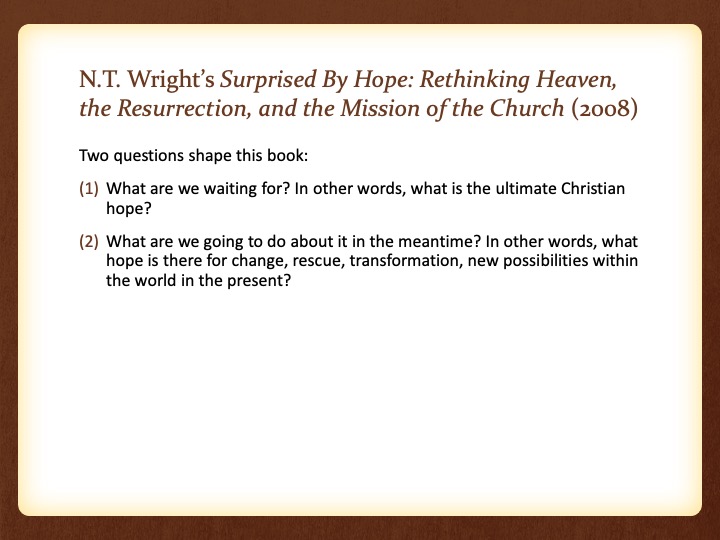
N.T. Wright’s Surprised By Hope: Rethinking Heaven, the Resurrection, and the Mission of the Church (2008)
And so now we come to "Surprised By Hope". Two questions shape this book:
(1)What are we waiting for? In other words, what is the ultimate Christian hope?
(2)What are we going to do about it in the meantime? In other words, what hope is there for change, rescue, transformation, new possibilities within the world in the present?
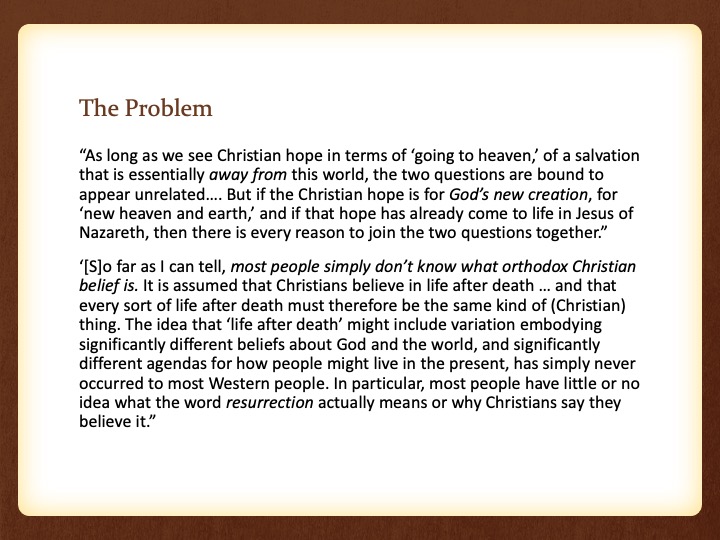
The Problem
“As long as we see Christian hope in terms of ‘going to heaven,’ of a salvation that is essentially away from this world, the two questions are bound to appear unrelated…. But if the Christian hope is for God’s new creation, for ‘new heaven and earth,’ and if that hope has already come to life in Jesus of Nazareth, then there is every reason to join the two questions together.”
‘[S]o far as I can tell, most people simply don’t know what orthodox Christian belief is. It is assumed that Christians believe in life after death … and that every sort of life after death must therefore be the same kind of (Christian) thing. The idea that ‘life after death’ might include variation embodying significantly different beliefs about God and the world, and significantly different agendas for how people might live in the present, has simply never occurred to most Western people. In particular, most people have little or no idea what the word resurrection actually means or why Christians say they believe it.”
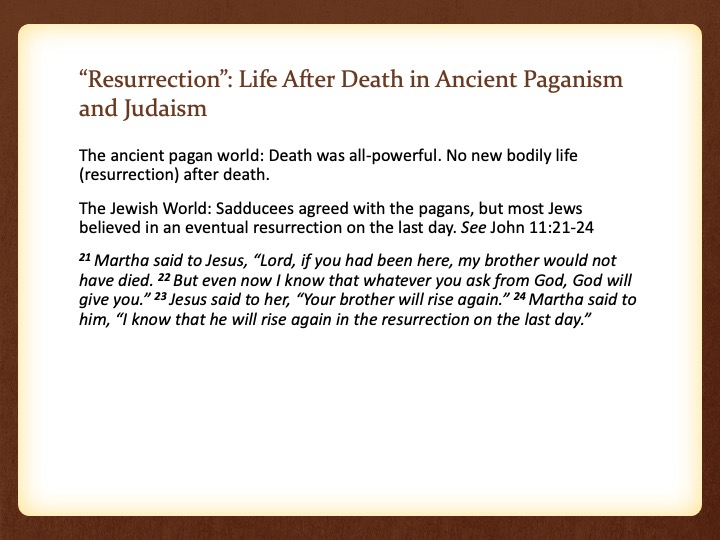
“Resurrection”: Life After Death in Ancient Paganism and Judaism
The ancient pagan world: Death was all-powerful. No new bodily life (resurrection) after death.
The Jewish World: Sadducees agreed with the pagans, but most Jews believed in an eventual resurrection on the last day. See John 11:21-24
21 Martha said to Jesus, “Lord, if you had been here, my brother would not have died. 22 But even now I know that whatever you ask from God, God will give you.” 23 Jesus said to her, “Your brother will rise again.” 24 Martha said to him, “I know that he will rise again in the resurrection on the last day.”
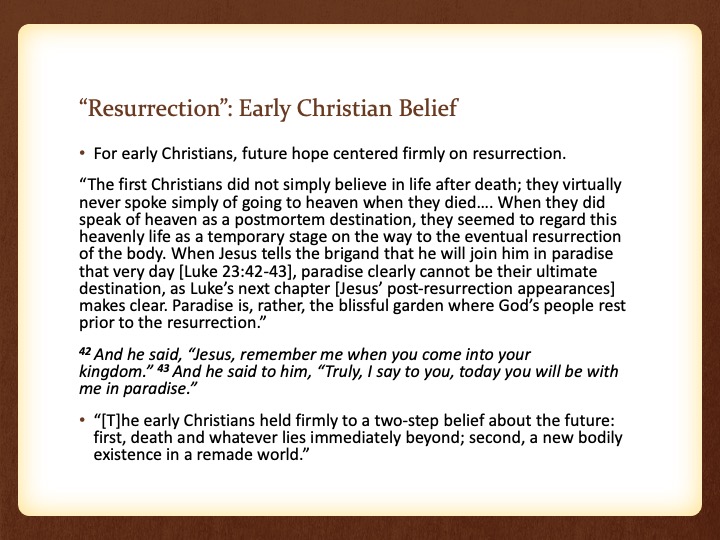
“Resurrection”: Early Christian Belief
For early Christians, future hope centered firmly on resurrection.
“The first Christians did not simply believe in life after death; they virtually never spoke simply of going to heaven when they died…. When they did speak of heaven as a postmortem destination, they seemed to regard this heavenly life as a temporary stage on the way to the eventual resurrection of the body. When Jesus tells the brigand that he will join him in paradise that very day [Luke 23:42-43], paradise clearly cannot be their ultimate destination, as Luke’s next chapter [Jesus’ post-resurrection appearances] makes clear. Paradise is, rather, the blissful garden where God’s people rest prior to the resurrection.”
42 And he said, “Jesus, remember me when you come into your kingdom.” 43 And he said to him, “Truly, I say to you, today you will be with me in paradise.”
“[T]he early Christians held firmly to a two-step belief about the future: first, death and whatever lies immediately beyond; second, a new bodily existence in a remade world.”
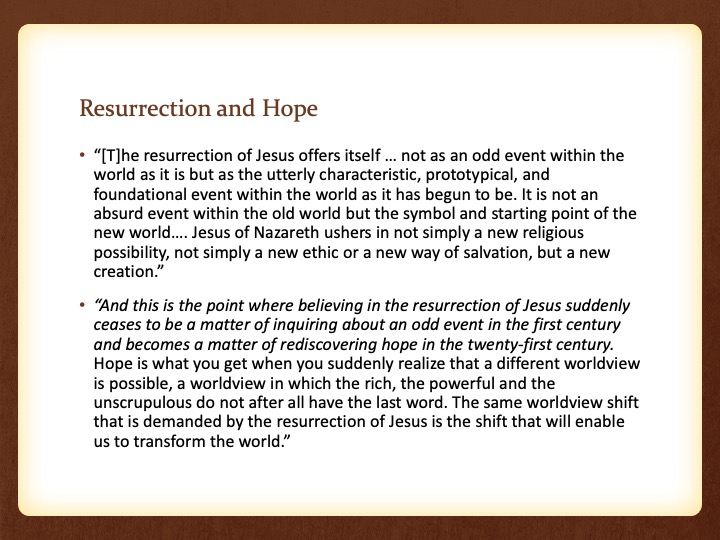
Resurrection and Hope
“[T]he resurrection of Jesus offers itself … not as an odd event within the world as it is but as the utterly characteristic, prototypical, and foundational event within the world as it has begun to be. It is not an absurd event within the old world but the symbol and starting point of the new world…. Jesus of Nazareth ushers in not simply a new religious possibility, not simply a new ethic or a new way of salvation, but a new creation.”
“And this is the point where believing in the resurrection of Jesus suddenly ceases to be a matter of inquiring about an odd event in the first century and becomes a matter of rediscovering hope in the twenty-first century. Hope is what you get when you suddenly realize that a different worldview is possible, a worldview in which the rich, the powerful and the unscrupulous do not after all have the last word. The same worldview shift that is demanded by the resurrection of Jesus is the shift that will enable us to transform the world.”
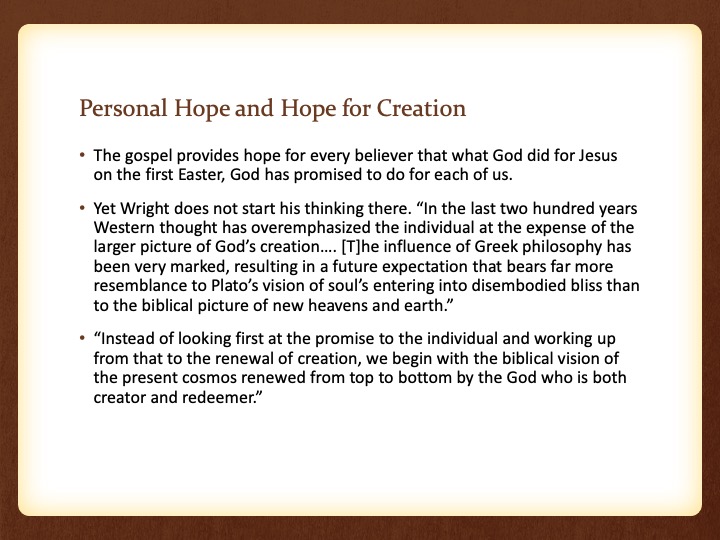
Personal
Hope and Hope for Creation
The gospel provides hope for every believer that what God did for Jesus on the first Easter, God has promised to do for each of us.
Yet Wright does not start his thinking there. “In the last two hundred years Western thought has overemphasized the individual at the expense of the larger picture of God’s creation…. [T]he influence of Greek philosophy has been very marked, resulting in a future expectation that bears far more resemblance to Plato’s vision of soul’s entering into disembodied bliss than to the biblical picture of new heavens and earth.”
“Instead of looking first at the promise to the individual and working up from that to the renewal of creation, we begin with the biblical vision of the present cosmos renewed from top to bottom by the God who is both creator and redeemer.”
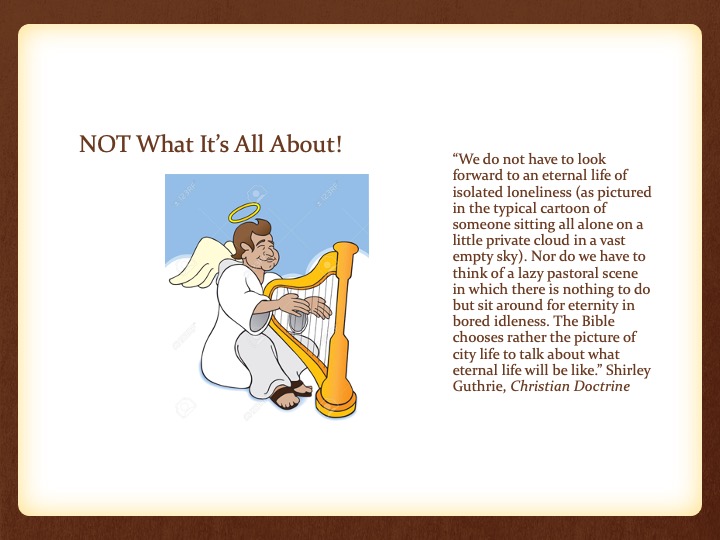
NOT What It’s All About!
“We do not have to look forward to an eternal life of isolated loneliness (as pictured in the typical cartoon of someone sitting all alone on a little private cloud in a vast empty sky). Nor do we have to think of a lazy pastoral scene in which there is nothing to do but sit around for eternity in bored idleness. The Bible chooses rather the picture of city life to talk about what eternal life will be like.” Shirley Guthrie, Christian Doctrine
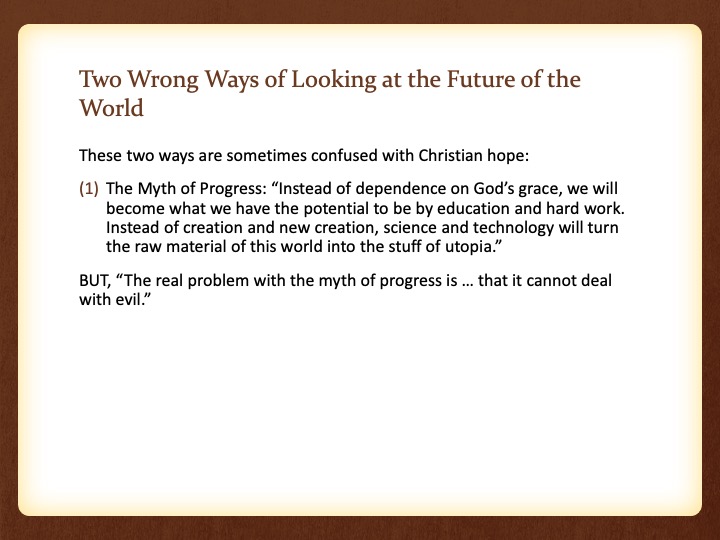
Two Wrong Ways of Looking at the Future of the World
These two ways are sometimes confused with Christian hope:
(1)The Myth of Progress: “Instead of dependence on God’s grace, we will become what we have the potential to be by education and hard work. Instead of creation and new creation, science and technology will turn the raw material of this world into the stuff of utopia.”
BUT, “The real problem with the myth of progress is … that it cannot deal with evil.”
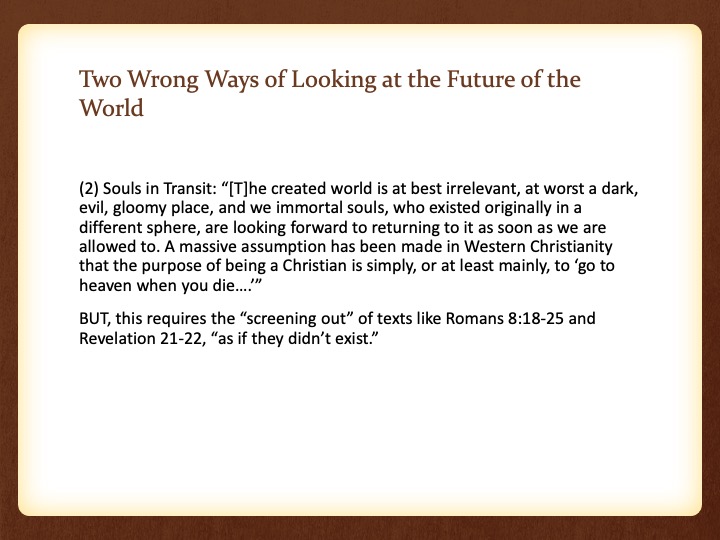
Two Wrong Ways of Looking at the Future of the World
(2) Souls in Transit: “[T]he created world is at best irrelevant, at worst a dark, evil, gloomy place, and we immortal souls, who existed originally in a different sphere, are looking forward to returning to it as soon as we are allowed to. A massive assumption has been made in Western Christianity that the purpose of being a Christian is simply, or at least mainly, to ‘go to heaven when you die….’”
BUT, this requires the “screening out” of texts like Romans 8:18-25 and Revelation 21-22, “as if they didn’t exist.”
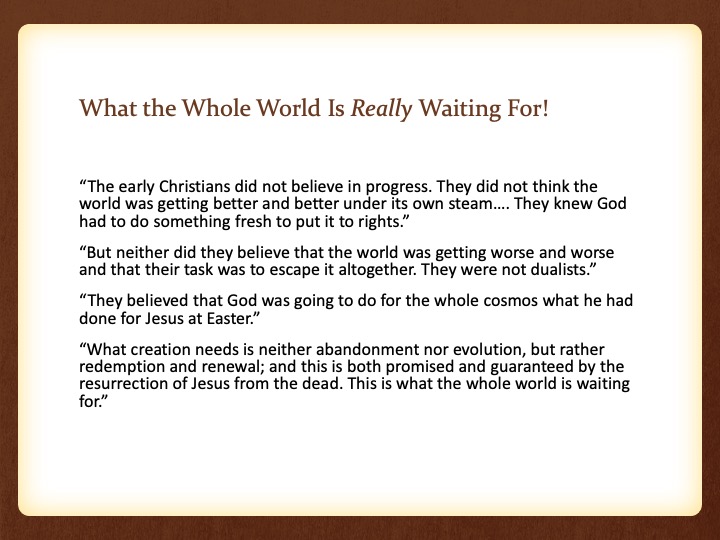
What the Whole World Is Really Waiting For!
“The early Christians did not believe in progress. They did not think the world was getting better and better under its own steam…. They knew God had to do something fresh to put it to rights.”
“But neither did they believe that the world was getting worse and worse and that their task was to escape it altogether. They were not dualists.”
“They believed that God was going to do for the whole cosmos what he had done for Jesus at Easter.”
“What creation needs is neither abandonment nor evolution, but rather redemption and renewal; and this is both promised and guaranteed by the resurrection of Jesus from the dead. This is what the whole world is waiting for.”
Christian Hope 1
Links
< Home Page> < Christian Hope Menu > < Top of Page >
Your first paragraph ...